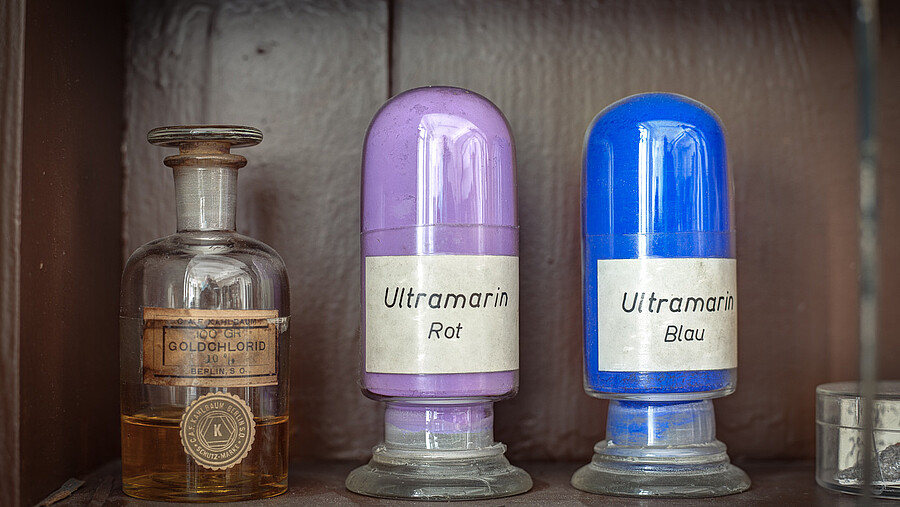Chemistry as subject in the Bachelor’s Teacher Training Course for Technical Education
(Bachelor of Science)
Profile
German HZB: none
International application: German C1
Find out more
Pre-study internship in the vocational subject (recommended).
Stay abroad possible, but not obligatory.
Short Description
Chemistry is offered as a teaching subject (or supplementary teaching subject) within the bachelor''s programme Technical Education. As first subject, a vocational subject must be studied. Please note the subject combination options.
Chemistry is life! Chemistry is a dynamic, exciting subject. Chemistry is everywhere around us – from the production of new materials to understanding biological systems, from the food we eat to the medication that keeps us healthy, from the quality of our drinking water to keeping the air we breathe clean.
The Bachelor''s programme Technical Education primarily trains future teachers who want to teach this exciting subject professionally and motivated in vocational schools. In addition to the well-founded theoretical education in the subjects of general chemistry, analytical chemistry, inorganic and organic chemistry, basic techniques in the practical courses general and analytical chemistry are taught.
In addition, the didactics of chemistry provides a first insight into the aspects of "teaching and learning" in the subject chemistry. In particular, major challenges such as heterogeneous learning groups or digitally supported learning are addressed.
Course Content
- Analytical chemistry
- General chemistry
- Inorganic chemistry
- Organic chemistry
The degree programme involves earning 92 credit points in the chosen vocational subject area, 48 credit points in the teaching subject and 25 credit points in the professional skills development area.
The professional skills development area consists of earning 15 credit points in Vocational and Business Education and 10 credit points in Key Transferable Skills. Students complete four weeks of practical training in Vocational and Business Education.
For the study of chemistry as subject in the Bachelor’s Teacher Training Course for Technical Education, scientific (especially physical) and mathematical basic knowledge is required.
In addition, students should enjoy experimenting, should not be afraid of dealing with chemicals and should have a general amount of manual skills.
In addition, they should be able to coordinate a time-consuming study with their other interests.
The Bachelor’s degree in Technical Education does not entitle graduates to teach at vocational schools – this is only possible after completing the relevant Master’s Teacher Training Course for Technical Education.
The Bachelor’s degree in Technical Education qualifies graduates to enter a profession in areas such as vocational education and training, for example for associations, chambers of industry or chambers of crafts and trades.
- Chemistry as subject in the Master’s Teacher Training Course for Technical Education (Master of Education)
- Master’s Teacher Training Course for Technical Education (Master of Education)
Under certain conditions, admission to the following Master''s programme is also possible. More detailed information can be found in the respective admission regulations. If you have any questions, please contact the course advice of the desired Master''s programme:
Admission Requirements
Some subjects in the Bachelor Teacher Training Course for Technical Education are restricted: Computer Science, English Studies (school subject: English), Food Science, German Studies (school subject: German), Politics and Sports.
Some subjects in the Bachelor Teacher Training Course for Technical Education are admission-free: Catholic Religious Education, Chemistry, Colour Technology and Interior Decoration, Electrical Engineering, Mathematics, Metals Technology, Physics, Plant Operations and Manufacturing of Wood Products, Protestant Religious Education, Spanish Studies and Site Engineering.
The exact admission requirements can be found in the admission regulations:
Application Deadlines
For a subject combination with at least one subject with restricted admission:
1 June - 15 July of the year for the winter semester
- First-year students (application for the 1st semester) can only apply for the winter semester.
- Those continuing their studies (application for higher semesters) can also apply for the summer semester (1 December - 15 January).
For a subject combination with two admission-free subjects:
1 June - 30 September of the year for the winter semester
- First-year students (application for the 1st semester) can only enrol in the winter semester.
- Students resuming their studies and transfer students (application for higher semesters) can also enrol in the summer semester (1 December - 31 March).
The following applies to applications from non-EU countries:
- VPD from uni-assist OR a passed assessment test (Feststellungsprüfung) of a preparatory foundation course (Studienkolleg) is required.
- Applications for the Studienkolleg must be submitted by 15 July.
Do you have questions about studying? We are happy to help!

30167 Hannover

30167 Hannover









